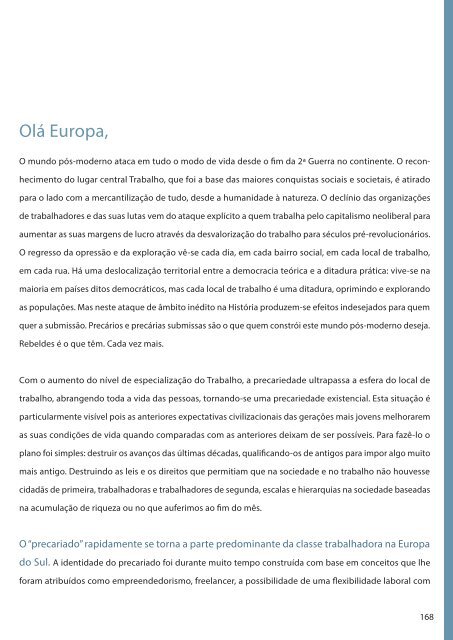cartas a @ s europe @ s cartas al europe letterstotheeuropeans
cartas a @ s europe @ s cartas al europe letterstotheeuropeans
cartas a @ s europe @ s cartas al europe letterstotheeuropeans
You also want an ePaper? Increase the reach of your titles
YUMPU automatically turns print PDFs into web optimized ePapers that Google loves.
Olá Europa,<br />
O mundo pós-moderno ataca em tudo o modo de vida desde o fim da 2ª Guerra no continente. O recon-<br />
hecimento do lugar centr<strong>al</strong> Trab<strong>al</strong>ho, que foi a base das maiores conquistas sociais e societais, é atirado<br />
para o lado com a mercantilização de tudo, desde a humanidade à natureza. O declínio das organizações<br />
de trab<strong>al</strong>hadores e das suas lutas vem do ataque explícito a quem trab<strong>al</strong>ha pelo capit<strong>al</strong>ismo neoliber<strong>al</strong> para<br />
aumentar as suas margens de lucro através da desv<strong>al</strong>orização do trab<strong>al</strong>ho para séculos pré-revolucionários.<br />
O regresso da opressão e da exploração vê-se cada dia, em cada bairro soci<strong>al</strong>, em cada loc<strong>al</strong> de trab<strong>al</strong>ho,<br />
em cada rua. Há uma desloc<strong>al</strong>ização territori<strong>al</strong> entre a democracia teórica e a ditadura prática: vive-se na<br />
maioria em países ditos democráticos, mas cada loc<strong>al</strong> de trab<strong>al</strong>ho é uma ditadura, oprimindo e explorando<br />
as populações. Mas neste ataque de âmbito inédito na História produzem-se efeitos indesejados para quem<br />
quer a submissão. Precários e precárias submissas são o que quem constrói este mundo pós-moderno deseja.<br />
Rebeldes é o que têm. Cada vez mais.<br />
Com o aumento do nível de especi<strong>al</strong>ização do Trab<strong>al</strong>ho, a precariedade ultrapassa a esfera do loc<strong>al</strong> de<br />
trab<strong>al</strong>ho, abrangendo toda a vida das pessoas, tornando-se uma precariedade existenci<strong>al</strong>. Esta situação é<br />
particularmente visível pois as anteriores expectativas civilizacionais das gerações mais jovens melhorarem<br />
as suas condições de vida quando comparadas com as anteriores deixam de ser possíveis. Para fazê-lo o<br />
plano foi simples: destruir os avanços das últimas décadas, qu<strong>al</strong>ificando-os de antigos para impor <strong>al</strong>go muito<br />
mais antigo. Destruindo as leis e os direitos que permitiam que na sociedade e no trab<strong>al</strong>ho não houvesse<br />
cidadãs de primeira, trab<strong>al</strong>hadoras e trab<strong>al</strong>hadores de segunda, esc<strong>al</strong>as e hierarquias na sociedade baseadas<br />
na acumulação de riqueza ou no que auferimos ao fim do mês.<br />
O “precariado” rapidamente se torna a parte predominante da classe trab<strong>al</strong>hadora na Europa<br />
do Sul. A identidade do precariado foi durante muito tempo construída com base em conceitos que lhe<br />
foram atribuídos como empreendedorismo, freelancer, a possibilidade de uma flexibilidade labor<strong>al</strong> com<br />
168<br />
Hello Europe,<br />
Since the end of the Second World War, the post-modern world has been attacking the way of life in Europe<br />
on <strong>al</strong>l fronts. Recognition of the centr<strong>al</strong> role played by labour, which formed the basis of the greatest soci<strong>al</strong><br />
and societ<strong>al</strong> gains, has been abandoned with the commodification of everything, from humanity to nature.<br />
The decline of workers’ organisations and their struggles is the result of a deliberate attack by neoliber<strong>al</strong><br />
capit<strong>al</strong>ism on those who work in order to increase profit margins by downgrading labour to the status of<br />
pre-revolutionary centuries. This return to oppression and exploitation can be seen every day, in every neigh-<br />
bourhood, workplace and street. The ground is shifting from democracy in theory to dictatorship in practice:<br />
most people live in so-c<strong>al</strong>led democratic countries, yet each workplace is a dictatorship that oppresses and<br />
exploits people. However, this unprecedented attack is producing undesirable effects for those who want<br />
submission. Those who build this post-modern world want a submissive, precarious workforce. What they<br />
are – increasingly - getting is rebellion.<br />
With the rise in speci<strong>al</strong>ised levels of work, precarious employment extends beyond the workplace to affect<br />
people’s entire lives, making it an existenti<strong>al</strong> form of precarity. This is particularly evident since the expecta-<br />
tions once held by younger generations of improving their living conditions in comparison with those of<br />
their predecessors are no longer feasible. It took a simple plan to achieve this: destroy the progress made<br />
in recent decades by c<strong>al</strong>ling it old-fashioned, in order to impose something much older. Destroy the laws<br />
and rights which ensured that there were no first-class citizens or second-class workers in society and in the<br />
workplace, or sc<strong>al</strong>es and hierarchies in society based on the accumulation of we<strong>al</strong>th or what we take home<br />
at the end of the month.<br />
The “precariat” is fast becoming the largest sector of the working class in southern Europe.<br />
The identity of the precariat was for a long time constructed on the basis of certain concepts attributed to it,<br />
such as entrepreneurism, freelancing and the possibility of flexible labour with enormous benefits. Economic<br />
169


